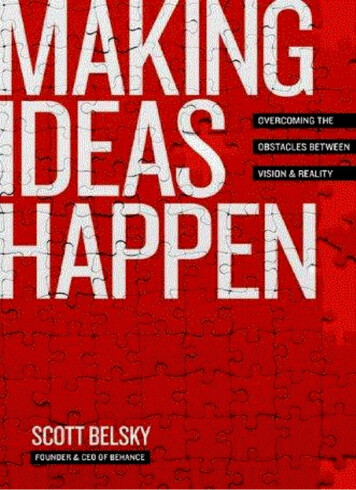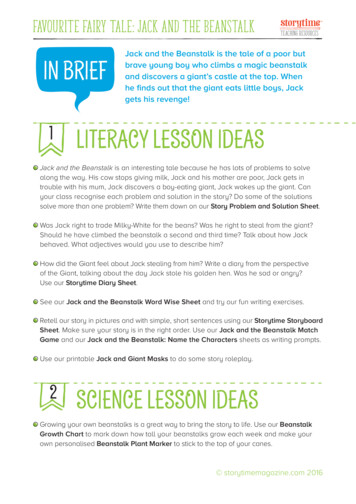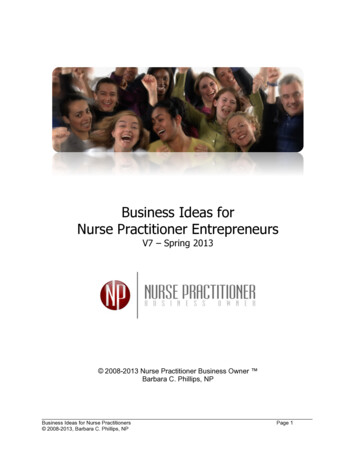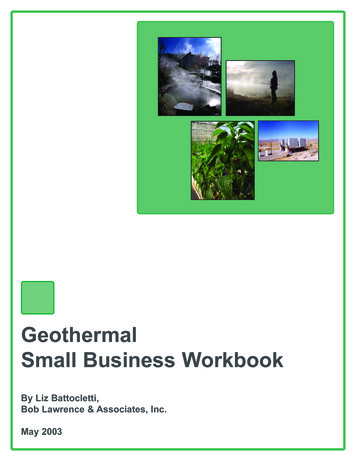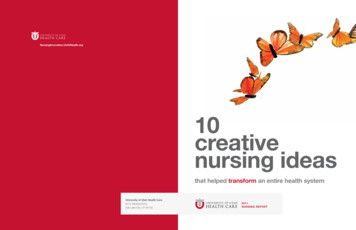
Transcription
12140 Sandler ffirs.f.qxd 2/16/05 2:54 PM Page i101 SmallBusiness Ideasfor Under 5,000Corey SandlerJanice KeefeJohn Wiley & Sons, Inc.
12140 Sandler ffirs.f.qxd 2/16/05 2:54 PM Page iv
12140 Sandler ffirs.f.qxd 2/16/05 2:54 PM Page i101 SmallBusiness Ideasfor Under 5,000Corey SandlerJanice KeefeJohn Wiley & Sons, Inc.
12140 Sandler ffirs.f.qxd 2/16/05 2:54 PM Page iiThis book is printed on acid-free paper. Copyright 2005 by Word Association, Inc. All rights reserved.Published by John Wiley & Sons, Inc., Hoboken, New Jersey.Published simultaneously in Canada.No part of this publication may be reproduced, stored in a retrieval system, or transmitted in any form or byany means, electronic, mechanical, photocopying, recording, scanning, or otherwise, except as permittedunder Section 107 or 108 of the 1976 United States Copyright Act, without either the prior written permissionof the Publisher, or authorization through payment of the appropriate per-copy fee to the Copyright ClearanceCenter, Inc., 222 Rosewood Drive, Danvers, MA 01923, (978) 750-8400, fax (978) 646-8600, or on the web atwww.copyright.com. Requests to the Publisher for permission should be addressed to the Permissions Department, John Wiley & Sons, Inc., 111 River Street, Hoboken, NJ 07030, (201) 748-6011, fax (201) 748-6008.Limit of Liability/Disclaimer of Warranty: While the publisher and author have used their best efforts inpreparing this book, they make no representations or warranties with respect to the accuracy or completeness of the contents of this book and specifically disclaim any implied warranties of merchantability or fitness for a particular purpose. No warranty may be created or extended by sales representatives or writtensales materials. The advice and strategies contained herein may not be suitable for your situation. The publisher is not engaged in rendering professional services, and you should consult a professional where appropriate. Neither the publisher nor author shall be liable for any loss of profit or any other commercialdamages, including but not limited to special, incidental, consequential, or other damages.For general information on our other products and services please contact our Customer Care Departmentwithin the United States at (800) 762-2974, outside the United States at (317) 572-3993 or fax (317) 572-4002.Wiley also publishes its books in a variety of electronic formats. Some content that appears in print maynot be available in electronic books. For more information about Wiley products, visit our web site atwww.Wiley.com.Library of Congress Cataloging-in-Publication DataSandler, Corey, 1950–101 small business ideas for under 5000 / Corey Sandler, Janice Keefe.p. cm.Includes index.ISBN 0-471-69287-5 (pbk.)1. New business enterprises. 2. Home-based businesses. 3. Small business. I. Title: Small businessideas for under 5000. II. Title: One hundred one small business ideas for under 5000. III. Title: Onehundred and one small business ideas for under 5000. IV. Keefe, Janice. V. Title.HD62.5.S272 2005658.1'141—dc22Printed in the United States of America10 9 8 7 6 5 4 3 2 12004059648
12140 Sandler ffirs.f.qxd 2/16/05 2:54 PM Page iiiTo William Sandler, about to embark on the first of what may be101 jobs in his career. Here’s hoping every one of them is a success.
12140 Sandler ffirs.f.qxd 2/16/05 2:54 PM Page iv
12140 Sandler ftoc.f.qxd 2/16/05 2:54 PM Page vContentsPrefaceixAcknowledgmentsxiHow to Use This BookxiiiChapter 1Business Insurance and Risk Management1Chapter 2Legalities and Taxes11Chapter 3Setting Your Price17Chapter 4Financing a Small Business25Chapter 5Home Services (Exterior)1 Lawn Mowing Service2 Snow Removal3 Garden Tilling4 Window Cleaning5 Deck Cleaning6 Landscape Designer7 Deck Construction8 Storage Sheds, Playhouses, Doghouses9 Children’s Outdoor Playset Installer10 Low-Voltage Outdoor Electrical Wiring11 Stonemason and Decorative Brick Worker29Chapter 6Home Services (Interior)12 Housecleaning13 Rug Cleaner14 Interior Decorator15 Upholstery and Slipcover Maker16 Wallpaper Hanger17 Specialty Indoor Painting18 Furniture Stripping19 Furniture Repair59
12140 Sandler ftoc.f.qxd 2/16/05 2:54 PM Page viviCONTENTS20212223Closet OrganizerBookcase and Shelf BuilderIndoor Plant CareCustom Silk and Dried Flower ArrangementsChapter 7Home Services (Specialty)24 Handyperson25 Errand Runner26 Vacation Home Caretaker27 Vacation House Watcher28 House Painting29 Chimney Cleaning30 Pool Service31 Firewood Delivery32 On-demand Trash Removal33 Christmas Tree Service34 Small Engine RepairChapter 8Parties, Entertainment, and Special Events35 Party Planner36 Children’s Event Organizer37 Party and Special-Event Rentals38 Catering39 Visiting Chef40 Specialty Cake Baker41 Prepared Custom-Meal Service42 Freelance Bartender43 Entertainer44 Holiday Decoration Service119Chapter 9Personal Services45 Personal Shopper46 Personalized Gift Basket Maker47 Travel Planner48 Historical Tours49 Personal Fitness Trainer50 Sports Trainer149Chapter 10 Children, Family, and Pet Services51 Babysitting52 Babysitting Agency89165
12140 Sandler ftoc.f.qxd 2/16/05 2:54 PM Page viiCONTENTS5354555657585960viiChildren’s Night OutVacation Child CareDog Walking and Vacation Pet VisitsPet Sitter and Doggie Day CareElder CompanionElder Care ConsultantGenealogical ResearchFamily BiographerChapter 11 Educational Services61 Tutoring62 Language Instructor63 Music Teacher64 Computer Instructor65 SAT or ACT College Test Preparation66 College Selection Advisor67 College Application Consultant68 Instructor at Community SchoolChapter 12 Arts, Crafts, Jewelry, Clothing,and Musical Instruments69 Alterations70 Custom Tailoring71 Custom Knitting, Sweater, and Afghan Design72 Custom Quiltmaker73 Jewelry Making74 Portraiture from Photographs75 Custom-Built Dollhouses76 Musical Instrument Tuning and Repair195217Chapter 13 Transportation, Delivery, and Auto Services77 Car Service78 Independent Delivery Contractor79 Auto Detailing237Chapter 14 Computers, Graphics, and Photography80 Computer Buying Consultant81 Computer Repair and Upgrade82 Web Design and Maintenance83 Graphic Designer84 Freelance Photographer247
12140 Sandler ftoc.f.qxd 2/16/05 2:54 PM Page viiiviiiCONTENTS85 Film to Digital Scanning86 Photo and Document Restorer87 VideographerChapter 15 Office and Professional Services27188 Temporary Secretary89 Transcription Services90 Temporary Worker at Conventions and Business Meetings91 Bookkeeping92 Billing Service93 Resume Design94 Letter WritingChapter 16 Sales95 Yard Sale Organizer96 Consignment Resale97 Antiques and Collectibles Wholesaler98 Used Book Reseller99 Tool and Equipment Rentals100 Newspaper Delivery Route101 Online Auctions: EBay and BeyondAppendixIndexGovernment and Private Resources for Small Businesses287309313
12140 Sandler flast.f.qxd 2/16/05 2:54 PM Page ixPrefaceEvery business—from neighborhood to global—begins with an idea.The next General Motors or Wal-Mart or Microsoft will not spring forth fullydeveloped from the back of an envelope. Big ideas need big funding.But your next job, or your next source of supplemental income, can beginwith a small idea and grow from there.The two keys to success in small business are these:1. Find something that makes good use of your skills and experience.2. Market that idea to people and businesses that need your product.In 101 Small Business Ideas for under 5000, you’ll find a realistic guide toturning your ideas and skills into a business that you can run part-time or fulltime or even as an absentee owner.Some of the other books about starting a small business are little more than alaundry list of job ideas, some practical, some ridiculously fanciful. There maybe millions to be made in recycling toxic waste, but it’s not realistic to considersetting up a processing plant in your backyard pool. You may be able to earn anice income running a dog-walking business, but you do need to give seriousthought to things like liability, health codes, and personal safety.Some jobs, such as babysitting or vacation house watch service, are simple toset up and run, and we discuss those and show you how to keep it simple andbeneath the radar. Other jobs very quickly become more complex. For these, wediscuss the real-world issues an entrepreneur will face: Start-up costs Legal matters Accounting and tax issues Liability insurance Zoning
12140 Sandler flast.f.qxd 2/16/05 2:54 PM Page xxPREFACEWe help you draw up a sensible business plan that can be used to direct thestart-up; to present to a banker, government agency, or foundation for funding;or to help design a publicity, marketing, and sales program. We give suggestionson how a successful business can be scaled up from a one-person start-up to amini-empire.Icons help you quickly identify the type of business, required skills, estimatedstart-up costs, and an indication of legal, zoning, and insurance requirements.Most of the jobs can be set up for just a few hundred to a few thousand dollars; for the more expensive start-ups, we show ways to ease into full operationone step at a time.
12140 Sandler flast.f.qxd 2/16/05 2:54 PM Page xiAcknowledgmentsA book is a piece of business that begins with an idea, followed by months ofhard work. In the case of the book you hold in your hand, the idea originated witheditor Michael Hamilton of John Wiley & Sons, in conjunction with trustedagent Gene Brissie.Though this finished book bears just two names on the cover, dozens of capable and creative people were involved in its conceptualization, design, production, and distribution.We’d like to thank the capable editors and production staff at John Wiley andNorth Market Street Graphics, including Linda Witzling, Christine Furry, LaineyHarding, Mary Jo Fostina, and Tracy Pitz.We also thank you, the reader, for buying this book. We wish you great success in starting your own small business and expanding it as far and wide as youcan dream.Corey Sandler and Janice Keefe
12140 Sandler flast.f.qxd 2/16/05 2:54 PM Page xii
12140 Sandler flast.f.qxd 2/16/05 2:54 PM Page xiiiHow to Use This BookVarious levels of professional assistance will be required in setting up your smallbusiness. We have tried to make it easy for you to zero in on some of the majorissues you may confront and who can best help to solve them. Following is anexplanation of the visual devices used in this book for quick reference.When to Seek Professional Advice➀ Legal➁ Legal➂ Legal➃ Accounting➄ Insurance➅ Insurance➀ LegalConsult an attorney for assistance in drawing up a contract that spells out theduties you will perform, the type and quality of materials you will use, the compensation you will receive for your work, and the schedule for payment. The contract should also identify any safety and security responsibilities of the client,and limit your liability for accidents, errors, and omissions.➁ LegalIf you will be entering a client’s property, home, or office while they are there, orif you will be given a key, alarm code, or permission to enter a client’s property,home, or place of business, the contract should include specific language limiting your liability for any incident that might be related to your access.
12140 Sandler flast.f.qxd 2/16/05 2:54 PM Page xivxivHOW TO USE THIS BOOK➂ LegalYour attorney should also be able to advise about the need for a business license,permits, or any special conditions, including noise ordinances, health codes, limitations on signs, and zoning concerns, including off-street parking for homebased businesses. Certain businesses also have to meet state and federaloccupational safety regulations.➃ AccountingSeek advice from an accountant about the form of business, tax reportingrequirements, and an acceptable accounting system to keep track of expenses,income, and profits. The accountant should also be able to advise about specialrequirements for setting up business bank accounts.➄ InsuranceDiscuss with an insurance agent the possible need for a business owner’s policy,separate liability insurance, and the need for commercial licensing and insurancefor any vehicles that might be used. Depending on your state and the nature ofyour business, you may need workers’ compensation coverage for yourself; ifyou have any employees, laws generally require such coverage for them. Somecommercial clients may require outside contractors to supply evidence of workers’ compensation coverage before they will permit you to perform work on theirpremises.➅ InsuranceIf you will be working with valuable possessions, including collectibles andantiques, make sure your insurance coverage protects you in the event of damageor loss, or that the owners have proper coverage that protects items on and offtheir property.There can be a huge difference between the actual value of an item (whichtakes into account depreciation) and the guaranteed replacement value (which isthe cost to buy an equivalent substitute). In the case of antiques and collectibles,an insurance company may insist on an independent appraisal to determine anitem’s value.
12140 Sandler flast.f.qxd 2/16/05 2:54 PM Page xvHOW TO USE THIS BOOKInformational Icons UsedCategoriesServiceProductTrade (skilled trade or craft)Creative (artistic or creative skills)Virtual companyChallengesSeasonalLiability (exposes business to liability)Hazardous (dangerous to the business operator)Children (involves working with children)Pets (involves working with pets)SkillsTechnicalComputerTraining or certificationFoodComplexityTools and equipment (requires specialized tools and equipment)Licenses or Permits (requires licenses, permits)Helper (requires helper)Web and phone salesHandicapped or homebound (can be conducted by physicallychallenged)xv
12140 Sandler flast.f.qxd 2/16/05 2:54 PM Page xvixviHOW TO USE THIS BOOKCapital Expenditures (not including vehicle or rental space) 0 to 1,000 1,001 to 3,000 3,001 to 5,000
12140 Sandler 01.f.qxd 2/16/05 2:38 PM Page 1CHAPTER1Business Insuranceand Risk Managementnce you’ve let your mind run rampant with dreams of profits, fun, and moreprofits, take a moment and ask yourself this question: What could possiblygo wrong?Let us suggest a few moments of doom and gloom:O One of your clients, or perhaps a delivery person, trips and falls over thecrack in the driveway you’ve been meaning to fix for the past three years. You somehow manage to lose the only copy of a precious family photograph that was entrusted to you to restore. You fail to advise a client of a critical deadline in filing a college application, causing her to be rejected for admission. A slip of a chisel cracks and destroys a priceless antique chair you’ve beenasked to refinish. When you clean a chimney you overlook a wobbly interior brick that fallsinto the flue weeks later, resulting in a smoky blaze that destroys the house. A product that you sell, even if you did not make it yourself or perform anyalterations on it, fails and causes damage to a person or property.
12140 Sandler 01.f.qxd 2/16/05 2:38 PM Page 22BUSINESS INSURANCE AND RISK MANAGEMENTThere’s a lot more to say than “oops” when you run a business. An accident,error, omission, or a negligent act by you or anyone in your employ could ruinyour business and even result in a claim against your personal assets. The severity of the threat could depend on: The way your business is set up The amount (or lack) of insurance you have The care with which the contract with the customer is drawnThat’s why we recommend you consult at least two commercial insurance agentsfor a risk assessment. Listen to the advice you are offered; ask lots of questions.Don’t be shy about requesting time: If agents don’t offer you good service beforethey’ve cashed your check, what makes you think they’ll be any better onceyou’re a client?We suggest you meet with more than one agent, at competitive companies.You may find one easier to understand or work with than another, or you mightfind a better deal.Don’t hide the fact that you are shopping around. The smartest entrepreneursare those who buy goods and services instead of being sold goods and services.And the best businesspeople are those who realize that they have to offer realvalue to their customers in the form of price, service, or both.Do the same when you seek a civil attorney who can help you protect yourself with limits of liability in your contracts and the form of your business. Askfor an introductory meeting with at least two lawyers. (In most instances, a shortpreliminary session is offered without charge.) Ask for advice and for an estimateof costs for specific services.Business Insurance BasicsEverything we do involves some amount of risk. Some risks are relatively minor:You could lose or break an inexpensive item; you could put a minor dent in thebumper of your car by hitting the trash can in your own garage; you could tripand fall in the driveway and skin a knee. In these minor accidents, you have noone to blame but yourself, and you are willing to shrug them off as ordinaryevents of life.Now consider the following risks: You could lose or break an expensivemusical instrument entrusted to you for repairing; you could have an accident
12140 Sandler 01.f.qxd 2/16/05 2:38 PM Page 3HOW SMALL IS TOO SMALL ?3with your car while driving someone to the airport as part of your car servicebusiness; the FedEx delivery person could trip and fall in your driveway andbreak a leg. In each of these incidents, you and your small business—no matterhow undersized—are liable to be sued for damages, sometimes for huge amountsof money.You also face the risk of loss due to theft of your equipment and supplies.Your business could be damaged by fire, flood, loss of heating, and other unforeseen events.Liability does not stop with obvious things like accidents. If you are operating a business, you face liability for injuries and losses caused by your servicesand products and for errors and omissions or negligence in advisory and consultative services.How Small Is Too Small?When we were kids, we gave no thought to lawsuits, liability, and insurancewhen we took jobs babysitting for the neighbors, mowing lawns, clearing snow,or selling cookies and bread at ball games.We would be remiss if we did not warn any reader of this book that we live ina litigious world. We’d like to think that any of the jobs we include in this bookcan be performed without risk to our readers or their customers, but that’s simplynot true.We’re not lawyers, and we’re not insurance agents. We recommend that at thevery least anyone planning to start a business find a capable and honest insuranceagent and have a meeting to discuss a reasonable level of coverage for a smallbusiness. You may find that the job you have in mind—at least in its small, earlystages—is protected by personal coverage you already have for your home orvehicle. Or you may find that the agent has serious concerns about your exposureto risk and recommends purchase of a new policy to protect you. It becomes acost of doing business.What is the price for a basic insurance policy? There is no simple answer tothat question, because insurance companies rate applicants based on the type ofbusiness and their experience in paying claims. Rates also differ depending ongeographic region, and within regions on whether the work takes place in anurban or a rural setting.In the broadest terms, we estimate that a basic business owner’s policy for anoccupation that is not particularly hazardous would cost somewhere between
12140 Sandler 01.f.qxd 2/16/05 2:38 PM Page 44BUSINESS INSURANCE AND RISK MANAGEMENT 250 and 1,000 per year. You may also need to obtain coverage for inventoryand for a vehicle used for commercial purposes.In the worst case, you may find that the insurance costs will be so high that itmakes your business plan unrealistic. In that situation, you should look for waysto reduce the risk and the cost, or find a different small business to start.Who Goes There? Liability forHome-Based BusinessesLet’s think about the types of people who might enter your home or place of business (which may be in your home, or elsewhere).Invitees are those who enter with your permission and for the purposes ofyour business or otherwise for your benefit. Included in this group would bethose making deliveries, pickups, garbage collections, and providing service ormaintenance. You need to make a reasonable effort to be on the lookout for dangerous conditions and post warnings about them.Licensees are those who enter with your permission but for their own purposes. For example, licensees include a government inspector, a member of thepolice or fire department, or a utility worker permitted to gain access because ofan easement. In general, your obligation to a licensee is to make them aware ofany dangerous conditions: Post a sign warning of slippery floors; install a properrailing on stairs; keep gates to hazardous areas closed.Trespassers are those who enter without your permission. In general, you donot have any legal responsibility to a trespasser, although there are situations,including those called attractive nuisances, where you may have some liabilityeven to those who break into your property or otherwise enter without your consent. For example, in most localities you have to take reasonable steps to preventeasy break-in to a swimming pool, to keep a cute but ferocious dog fenced in, orto protect unwanted visitors from getting close to dangerous power tools andother equipment. Consult an attorney and your insurance agent to help assessrisks in this area.Be sure to consult with your insurance agent and attorney about any state orlocal laws or regulations that would affect your area, and ask about any particular liabilities associated with your type of business. Your homeowner’s or business insurance should protect against personal injuries. Your attorney can adviseyou in setting up a form of business that shields your personal assets from mostlawsuits and liability, shifting responsibility to your business.
12140 Sandler 01.f.qxd 2/16/05 2:38 PM Page 5ASSESSING YOUR RISKS5Assessing Your RisksAdvisors recommend that business owners include a careful assessment of risksfaced by an enterprise, no matter how small. Risk management starts with identifying various exposures to risk and then deciding on the best way to deal witheach of them.With each exposure to risk, determine how serious it would be, and whetherthe loss is one that you could afford to bear or whether you need to find a way tooffset that risk in some way.One of the first things you should do as you draw up your business plan is tomake contact with a capable and well-informed commercial insurance agent.Shop around to find an agent who is able to communicate with you and (this ishardest to find) willing to put your interests above all, even above his or her salescommission. Ask friends, family, and business acquaintances for recommendations.One way to deal with the possibility of risk is to mount an active campaign toreduce exposure. For example, you might choose not to accept very valuableitems for repair unless the owner relieves you of liability or pays for specialinsurance coverage. You might choose not to sell particular products because ofan increased likelihood of liability: for example, trampolines, diving boards, andweapons.You might choose to insist on replacing broken parts with new ones insteadof making repairs, because new parts have higher reliability. You might choose toaccept a babysitting job but refuse to transport children to or from school or otheractivities.Some insurance companies will provide free or low-cost consulting servicesto their clients to help them reduce exposure to loss, something that benefits boththe policyholder and the issuer.Another option is risk retention or self-insurance. A business might decide itcan accept occasional losses as part of the ordinary cost of doing business andbuild the expense into prices. A garden nursery cannot expect to collect for theloss of a few plants because of an unexpected freeze; the selling price for healthyplants includes an allowance to cover previous or anticipated losses.This is the sort of decision we might make for our personal automobile: If itis more than a few years old and has declined in value, it might make sense toeliminate collision coverage and reduce the value of the replacement cost. (At thesame time, you would not want to skimp on liability coverage to protect you fromclaims for damage to others or to their property.
12140 Sandler 01.f.qxd 2/16/05 2:38 PM Page 66BUSINESS INSURANCE AND RISK MANAGEMENTThe third option is to transfer the risk. This can be done by purchasing insurance for your company, or you may be able to find ways to have others assumerisks as part of your business relationship with them.One way you could transfer risk would be to hire an independent truckingcompany to make pickups and deliveries for your company.We discuss various types of insurance you can purchase later in this chapter.Understanding Insurable RisksWhat, exactly, are you protecting against when you purchase a business policy?Typical named risks include the following.Physical DamageLosses due to fire, storm damage, vandalism, broken pipes, failed heating systems, and other incidents may be insured against. You could lose finished goods,raw materials, tools, and other elements of your business. The loss could alsooccur to your clients’ property that has been deposited with you for repair, maintenance, or processing.If your business is operated in a room of your home, it may be possible toadd a rider or extension to your homeowner’s or renter’s policy to cover a smallbusiness.Criminal ActivityYou could lose property, your own or items belonging to customers, due to theftor robbery. If you will be working with valuable items such as jewelry or worksof art, make sure you are fully covered.LiabilityA business or its owner may be required to pay for bodily injury or destruction ofproperty suffered by others. The payment may be required as the result of a courtruling in a legal case, an out-of-court settlement of a lawsuit, or as an element ofa contract that makes you or your company responsible for certain types oflosses.Liability insurance usually includes the costs of defending you against a lawsuit for a claim that is covered under the policy.A company can also be required by law to assume liability for certain occurrences such as injuries that fall under workers’ compensation coverage.
12140 Sandler 01.f.qxd 2/16/05 2:38 PM Page 7TYPES OF INSURANCE COVERAGE7Public liability refers to injuries or losses by customers, visitors, and otherswho are not employees. The liability is incurred as the result of provable negligence or fault. The exposure here would include an injury due to broken pavement, a slippery floor, improper installation or repair of a product provided to acustomer, or a new product that is defective.If you rent a home, office, or place of business, your lease may transfer liability for injury from the owner of the property to the renter; consult an attorneyto be sure of your responsibility.Liability to employees generally falls under workers’ compensation laws,which vary from state to state. In some states, not all types of businesses arerequired to have such policies, and in some localities, the owner of a one-personbusiness is exempt from the requirement to have such a policy. Again, consultwith a capable insurance agent to find out the laws that apply in your area.If you will be starting and running a small business that will take you into theoffices and workplaces of other companies, you may find that their insurancecarriers require that anyone doing business with them show evidence of a currentworkers’ compensation policy.Business InterruptionAn element of business packages is coverage to help you get past a shutdown ofyour business due to a direct loss (one that is covered by other elements of yourpolicy). For example, if your office or workshop is damaged by fire, you couldcollect the current or replacement value of the items and receive some paymentfor income you lose while the business is unable to operate. The money couldhelp pay for taxes, loans, utilities, and other fixed costs that don’t stop even whenyour business does.Disability or Death of Owner or Key PersonWhat if your business is entirely dependent on the health and involvement of asingle person: an expert, an artisan, or a salesperson? If that person were to die orbecome incapacitated, the business might grind to a halt. Some policies in thisarea amount to specialized life insurance, with the business or the business ownerlisted as beneficiary.Types of Insurance CoverageThe insurance industry packages named risks into classes of policies intended tocover various forms of business or business activities.
12140 Sandler 01.f.qxd 2/16/05 2:38 PM Page 88BUSINESS INSURANCE AND RISK MANAGEMENTCommercial General LiabilityThe basic form of business liability coverage protects (up to policy limits)against damage or loss to property, bodily injury, personal injury (including slander or libel), and advertising injury and related claims.A good policy also extends to other liabilities, including protection for damages and legal expenses related to an injury caused by a product or service provided by your company, other kinds of product liability, and liability for certainrisks you may assume under a contract.Property CoverageThis sort of policy offers protection against loss or damage to your businessproperty as the result of fire, theft, and certain other situations. (Some policiesexclude or limit loss due to floods, windstorms, and other risks.)Depending on the nature of your business, you may need to extend coverageto protect against loss of pr
101 Small Business Ideas for under 5000, you’ll find a realistic guide to turning your ideas and skills into a business that you can run part-time or full-time or even as an absentee owner. Some of the other books about starting a small business are little more than a laundry list of job ideas




